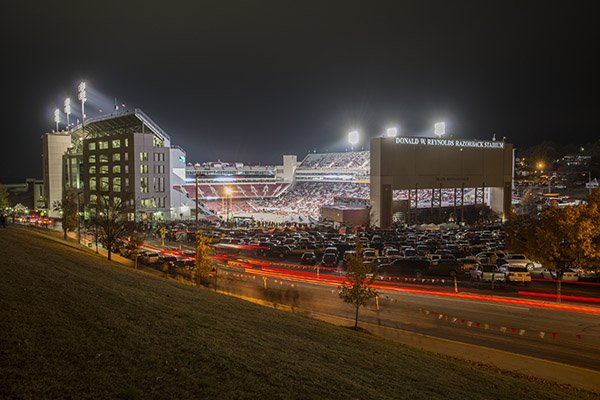As former members of the University of Arkansas Board of Trustees, we write to express our concern about the proposed $160 million expansion of Razorback Stadium on the Fayetteville campus, and to support UA trustee David Pryor's position on the matter.
From what we read in the media, it appears this project is headed toward completion, with the Board of Trustees having given some preliminary approval already, and another vote on the project perhaps to come at the board meeting scheduled Thursday.
Who wrote this:
This guest commentary represents the views of five former members of the University of Arkansas Board of Trustees: John H. Tyson of Springdale; Kaneaster Hodges of Newport; Frances Cranford of Little Rock; Diane Nolan Anderson of El Dorado; and Jack L. Williams of Texarkana/Little Rock.
Guest writers
We are all avid Razorback fans, and have been for many years, but we just cannot support this project at this time. It is simply too much, at the wrong time, and we hope the UA Fayetteville administration and the Board of Trustees will put it on hold until the questions that David Pryor has asked, and a lot more, can be answered.
The last time Razorback Stadium was renovated and expanded, approximately 20 years ago, we spent roughly $100 million to update the facilities and add about 20,000 seats. That worked out to be about $5,000 per additional seat. Since that time, our best guess is that we have had maybe 10 or 12 games "sell out," but only two or three truly "full houses" in those 20 years. Now we are planning to spend another $160 million (that will in all likelihood end up being $200 million-plus), and are only adding approximately 3,000 seats. Since we have very seldom, in 20 years, filled the stadium up, we really don't need many, if any, additional seats but we're still going to spend another $160 million to $200 million on the facility? This simply defies all logic. So, if we aren't getting many more seats, what is all that money going to be spent for? We are told it is for more luxury suites, other amenities like an even bigger additional electronic scoreboard, luxurious new offices for the Athletic Department's ever-increasing staff, and underground parking and private elevators for that staff, so they don't have to walk in the rain to get to their new offices.
Can we really afford this kind of project on a campus where we don't have enough classrooms in which to teach our students, we are told we can't afford to adequately equip our science labs, and our staff and faculty are still woefully underpaid? We believe our priorities on the Fayetteville campus are just wrong. Instead of focusing on luxury suites for the very few among us who can afford them, think about what could be done with an additional $160 million to $200 million dollars for our students, our faculty and staff, and our academic programs. We might even be able to figure out a way to get our faculty salaries out of the absolute bottom of the rankings of the 50 states. Excellence in these areas should be our priorities, instead of being known for having the most luxurious sky boxes in the SEC and an office building for the Athletic Department that is second to none.
If all of this were being done totally with private contributions that would be one thing, but, well more than half of the money to be spent is going to be borrowed by the university through the issuance of bonds backed by ticket sales revenue. This is another issue that gives us pause. The ability to pay back $120 million in debt being dependent on ticket sales and the number of football games we win over the next 20 years is something the Board of Trustees need to think long and hard about. And, of course that $120 million figure is not actually the total cost for getting the bonds paid off. Over the 20-year life of the bonds, the actual payment of principal, interest, fees and commissions will probably bring the total cost of the $120 million bond issue to more than $200 million.
With the financial support from the state already under serious pressure, and consideration being given to completely changing how state support is calculated (to focus on "outcomes" instead of simple enrollment numbers), and with tuition continuing to skyrocket, making it more and more difficult for the average student to be able to afford higher education, we simply believe this is a terrible time for the U of A in Fayetteville to make a commitment to this kind of debt, especially for this purpose. We encourage the Board of Trustees to slow this project down and continue to review its priorities.
Commentary on 06/15/2016

